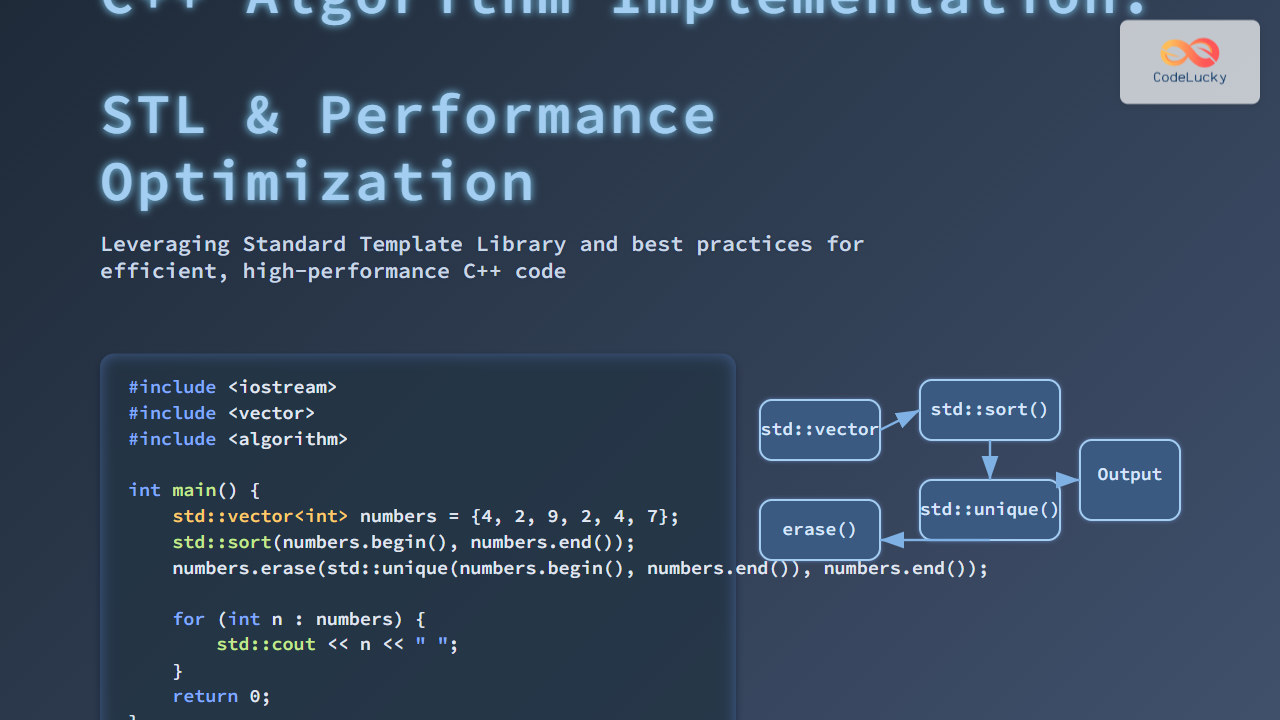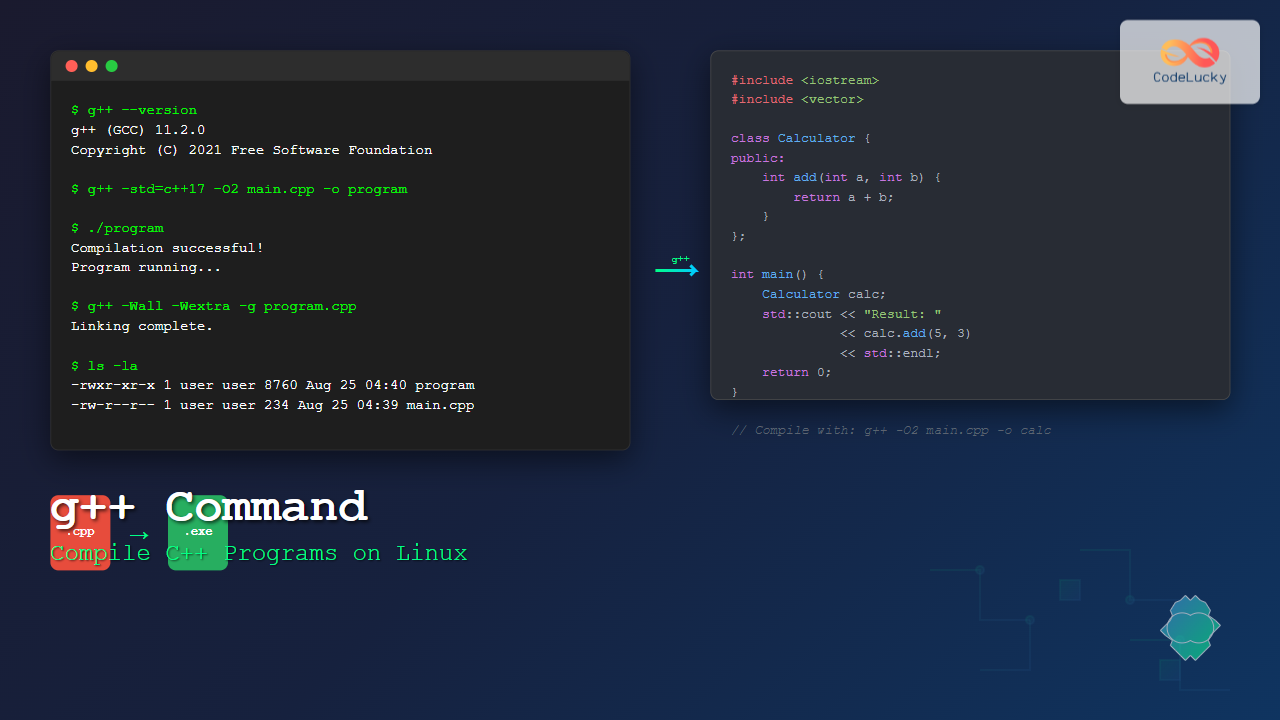In the world of C++, perfect forwarding is a powerful technique that allows you to pass arguments to another function while preserving their original value categories. This concept is crucial for writing efficient and flexible code, especially when dealing with generic programming and template metaprogramming. In this comprehensive guide, we'll dive deep into perfect forwarding, exploring its intricacies and demonstrating its practical applications with numerous examples.
Understanding Value Categories
Before we delve into perfect forwarding, it's essential to understand value categories in C++. Value categories describe the properties of expressions, particularly whether they refer to objects, values, or functions, and whether they can be moved from.
In C++11 and later, there are three primary value categories:
- 🔷 lvalue: An expression that refers to a persistent object.
- 🔶 prvalue: A temporary expression that computes a value.
- 🔹 xvalue: An "eXpiring" value, which represents an object that can be moved from.
Additionally, there are two mixed categories:
- 🔸 glvalue: A "generalized" lvalue, which includes both lvalues and xvalues.
- 🔺 rvalue: Includes prvalues and xvalues.
Understanding these categories is crucial for grasping the concept of perfect forwarding.
The Need for Perfect Forwarding
Perfect forwarding addresses a common problem in generic programming: how to pass arguments to a function while preserving their value categories. This is particularly important when writing wrapper functions or implementing forwarding constructors.
Consider the following scenario:
template<typename T, typename Arg>
T create(Arg arg) {
return T(arg);
}
This simple factory function takes an argument and constructs an object of type T. However, it has a limitation: it always passes arg as an lvalue to the constructor of T, even if it was originally an rvalue. This can lead to unnecessary copying and reduced performance.
Enter Perfect Forwarding
Perfect forwarding solves this problem by using two key C++ features:
- Universal references (also known as forwarding references)
std::forward
Let's modify our create function to use perfect forwarding:
template<typename T, typename Arg>
T create(Arg&& arg) {
return T(std::forward<Arg>(arg));
}
Now, let's break down the components of perfect forwarding:
Universal References
The Arg&& syntax in the function parameter is a universal reference. It can bind to both lvalues and rvalues. The behavior depends on how the function is called:
- If called with an lvalue,
Argis deduced to be an lvalue reference. - If called with an rvalue,
Argis deduced to be a non-reference type.
std::forward
std::forward is a conditional cast that preserves the value category of the original argument. It works as follows:
- If
Argis an lvalue reference type,std::forward<Arg>(arg)will be an lvalue. - If
Argis a non-reference type,std::forward<Arg>(arg)will be an rvalue.
Practical Examples of Perfect Forwarding
Let's explore some practical examples to illustrate the power of perfect forwarding.
Example 1: Forwarding Constructor
Consider a class that wraps another object and forwards its constructor arguments:
#include <iostream>
#include <utility>
#include <string>
class WrappedString {
std::string m_str;
public:
template<typename T>
WrappedString(T&& str) : m_str(std::forward<T>(str)) {
std::cout << "Constructed with " << (std::is_rvalue_reference<T&&>::value ? "rvalue" : "lvalue") << std::endl;
}
const std::string& get() const { return m_str; }
};
int main() {
std::string hello = "Hello, World!";
WrappedString w1(hello); // lvalue
WrappedString w2("Hello, C++!"); // rvalue
WrappedString w3(std::move(hello)); // rvalue
std::cout << "w1: " << w1.get() << std::endl;
std::cout << "w2: " << w2.get() << std::endl;
std::cout << "w3: " << w3.get() << std::endl;
}
Output:
Constructed with lvalue
Constructed with rvalue
Constructed with rvalue
w1: Hello, World!
w2: Hello, C++!
w3: Hello, World!
In this example, the WrappedString constructor uses perfect forwarding to efficiently construct its internal std::string member. It preserves the value category of the argument, allowing for both copying and moving as appropriate.
Example 2: Variadic Templates and Perfect Forwarding
Perfect forwarding shines when combined with variadic templates, allowing us to forward an arbitrary number of arguments:
#include <iostream>
#include <utility>
#include <string>
class Person {
std::string m_name;
int m_age;
public:
Person(const std::string& name, int age) : m_name(name), m_age(age) {
std::cout << "Constructing Person with lvalue name" << std::endl;
}
Person(std::string&& name, int age) : m_name(std::move(name)), m_age(age) {
std::cout << "Constructing Person with rvalue name" << std::endl;
}
void print() const {
std::cout << "Name: " << m_name << ", Age: " << m_age << std::endl;
}
};
template<typename... Args>
Person createPerson(Args&&... args) {
return Person(std::forward<Args>(args)...);
}
int main() {
std::string name = "Alice";
auto p1 = createPerson(name, 30); // Uses lvalue constructor
auto p2 = createPerson("Bob", 25); // Uses rvalue constructor
p1.print();
p2.print();
}
Output:
Constructing Person with lvalue name
Constructing Person with rvalue name
Name: Alice, Age: 30
Name: Bob, Age: 25
In this example, createPerson perfectly forwards its arguments to the Person constructor, preserving their value categories. This allows the appropriate constructor to be called based on whether the name is an lvalue or rvalue.
Example 3: Perfect Forwarding in Lambda Expressions
C++14 introduced generic lambdas, which can use perfect forwarding:
#include <iostream>
#include <utility>
#include <functional>
template<typename F, typename T>
void invoke(F&& f, T&& arg) {
std::forward<F>(f)(std::forward<T>(arg));
}
int main() {
auto print = [](auto&& x) {
std::cout << "Value: " << std::forward<decltype(x)>(x) << std::endl;
};
int i = 42;
invoke(print, i); // lvalue
invoke(print, 3.14); // rvalue
std::string s = "Hello";
invoke(print, s); // lvalue
invoke(print, std::move(s)); // rvalue
}
Output:
Value: 42
Value: 3.14
Value: Hello
Value: Hello
This example demonstrates how perfect forwarding can be used in combination with generic lambdas and higher-order functions.
Common Pitfalls and Considerations
While perfect forwarding is powerful, there are some pitfalls to be aware of:
-
🚫 Forwarding references only work with template parameters:
void f(auto&& x) // C++20: OK, deduces x void f(T&& x) // Error: T is not a template parameter of f -
🚫 Perfect forwarding of array arguments can be tricky:
Arrays may decay to pointers, losing size information. -
⚠️ Overload resolution can be affected:
Perfect forwarding can sometimes lead to unexpected overload resolution. -
🔍 Debugging can be more challenging:
The use of templates and perfect forwarding can make code harder to debug.
Performance Implications
Perfect forwarding can have significant performance benefits:
- 🚀 Avoids unnecessary copying of objects
- 🔧 Allows for move semantics when possible
- 🔢 Reduces the number of function overloads needed
However, it's important to profile your code to ensure that perfect forwarding is actually providing benefits in your specific use case.
Conclusion
Perfect forwarding is a powerful technique in C++ that allows for efficient and flexible generic programming. By preserving value categories, it enables the creation of highly reusable code that can work with both lvalues and rvalues efficiently.
As we've seen through various examples, perfect forwarding is particularly useful in scenarios such as:
- Implementing forwarding constructors and factory functions
- Creating generic wrapper classes
- Working with variadic templates
- Enhancing the flexibility of lambda expressions
While perfect forwarding does come with some complexities and potential pitfalls, understanding and mastering this technique can significantly improve the efficiency and expressiveness of your C++ code.
Remember, the key to effective use of perfect forwarding lies in understanding value categories, universal references, and the std::forward function. With these tools at your disposal, you can write more efficient, flexible, and expressive C++ code.
As you continue to explore C++, keep perfect forwarding in mind as a powerful tool for creating generic, efficient code that can adapt to a wide variety of use cases while maintaining optimal performance.

















